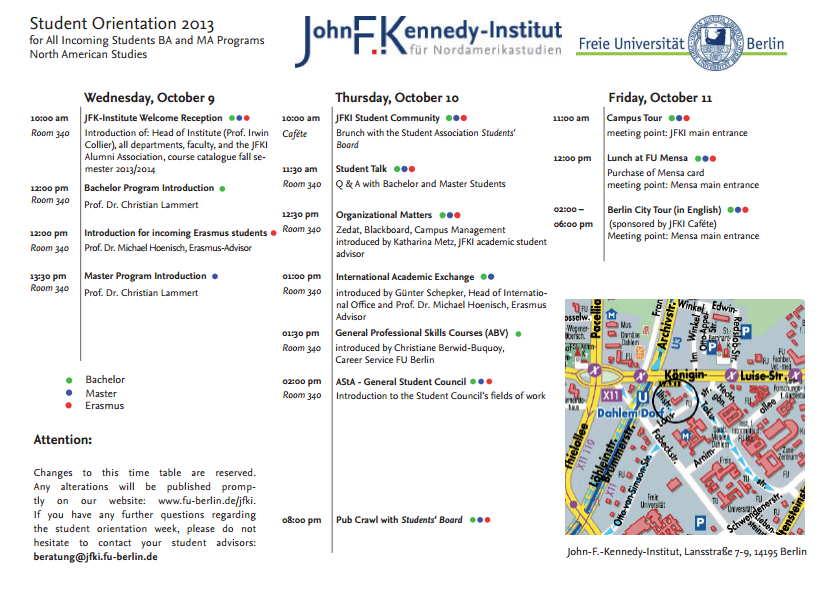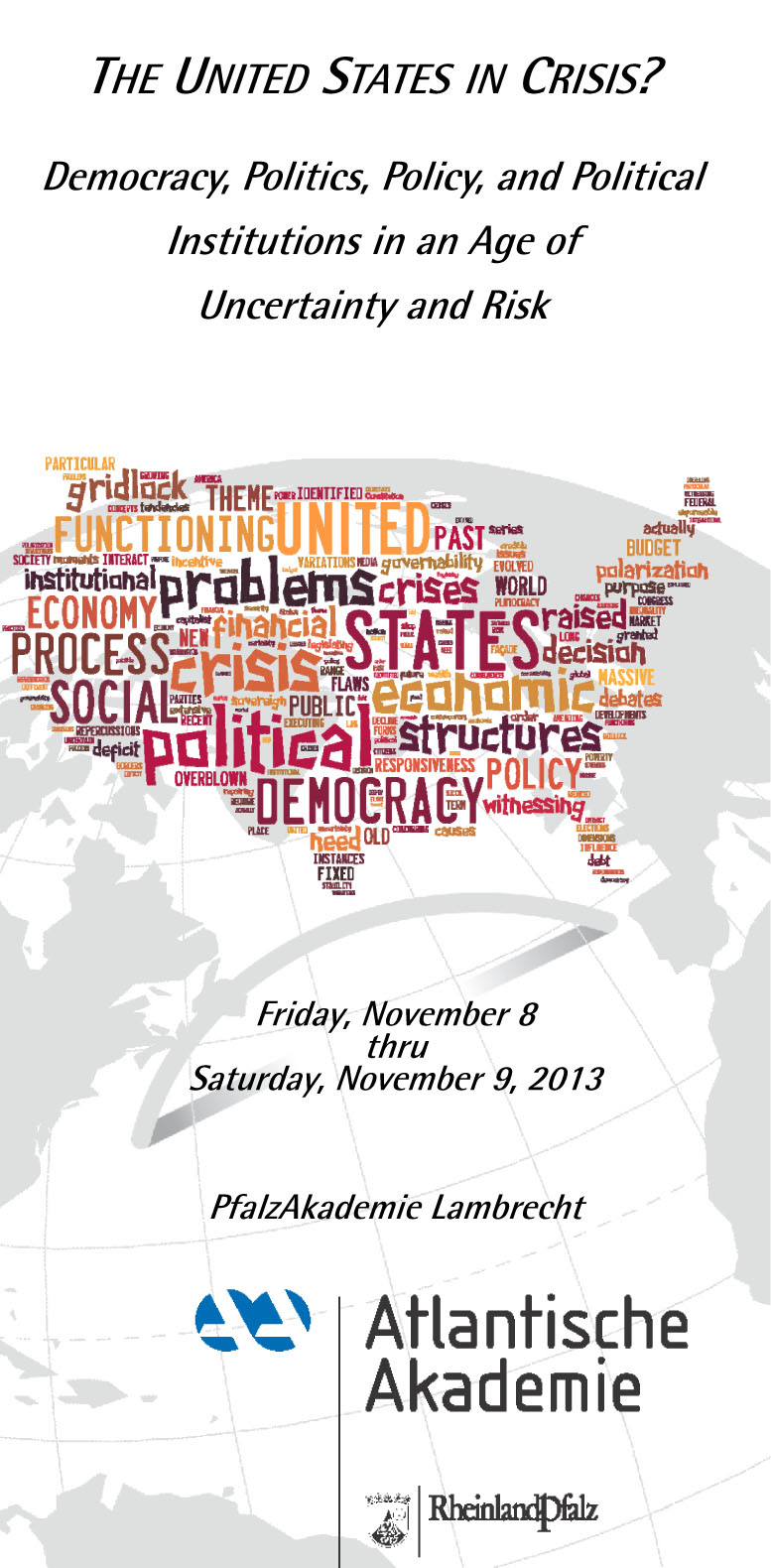12. November 2013 von Curd Knüpfer
The following seminar announcement just came over „Institutsverteiler“ and may be of interest:
.
.
Friday 15.11 and Saturday 16.11, the first meeting of the new Schlegel Lecture cum Seminar series will take place. For this first meeting, we have invited Laurence Rickels, a psychoanalyst and literary / media theorist known for his work on Nazis, vampires and monsters.
On friday 15.11 at 18.00, prof. Rickels will hold a lecture titled „The Rocket and the Ambivalent Introject“ in room JK 29/118 (Habelschwerdter Allee 45). It deals with V2 rockets.
On saturday 16.11 at 12.00, he will host a seminar, in which we will discuss H.G. Wells‘ novella
The Time Machine and Chris Marker’s short film
La Jetée, which will be discussed in relation to some theoretical work on photography. We will watch the film at the beginning of the seminar. The book is available here:
https://www.gutenberg.org/ebooks/35
Registration is not required. More information can be found here: https://schleminar.wordpress.com/
Or here: https://www.facebook.com/events/1393406887562751/
Kategorie Announcements, Department of Culture, Department of Literature | Kommentare deaktiviert für Lecture cum Seminar with Laurence Rickels
6. November 2013 von Curd Knüpfer
Kategorie Department of Political Science, Veranstaltungen | Kommentare deaktiviert für Lecture by Sean M. Theriault
30. Oktober 2013 von Curd Knüpfer
Kategorie Department of Political Science, Veranstaltungen | Kommentare deaktiviert für Forschungskolloquium der Abteilung Politik: Roundtable Discussion on the Shutdown
23. Oktober 2013 von Alyn Euritt

The speaker schedule for the History Colloquium this winter is ready! Click here for a .pdf copy. See you on November 11th!
Kategorie General Information | Kommentare deaktiviert für History Colloquium 2013-14
20. Oktober 2013 von Florian Sedlmeier
In the Sunday Review of The New York Times, I found a piece by Jenna Wortham about the phenomenon of selfies, the media-tech update of the artistic convention of the self-portrait. At one point, rather in passing, the article seems to suggest an understanding of the cultural significance of the selfie that challenges my own reductive, uninformed, and anything but ingenious Sunday morning sermon on how certain online platforms that are geared to visual presentations of the self are about our narcissism, about presenting ourselves to our peers, and about those infamous fifteen minutes of fame; or how these platforms are about staging our selves and our in-group as distinct by linking to and exposing others who are stupid enough to fall for that fifteen minutes of fame thing. Turns out selfies may be about something else, too. While they are about the wish to leave a mark of one’s existence (still an interestingly persistent thought in these fleeting digital times) and about one’s face (selfies are visual, after all), they are not just about face-work but also, and quite simply, about one’s facial self being somewhere and doing something ordinary and sharing it – Wortham suggests the phrase „visual diary“ at the end of her article.
Below is the excerpt that caught my attention. It contains the wonderfully rich phrase of turning one’s camera inward on one’s self and it starts with a quote from Dom Hofmann, co-creator of the video clip app Vine:
„‚It wasn’t really about vanity at all,“ he said. „It’s not really about how you look. It’s about you doing something else, or you in other places. It’s a more personal way to share an experience.‘
The feedback loop that selfies can inspire doesn’t hurt, either. As an early Instagram user, I rarely turned the camera on myself. I preferred sharing pictures of sunsets, crazy dance parties and bodega cats to showing off a new haircut or outfit. But over the last year or so, I’ve watched as all my peers slowly began turning their cameras inward on themselves. It’s made my feed more interesting and entertaining. And I’d much rather see my friends’ faces as they prepare food than a close-up photo of the finished meals instead. The rare occasion when I feel bold enough to post a full-face frontal, I see spikes in comments and feedback, the kind that pictures of a park or a concert photo rarely get.“
Here is the link to the full article:
https://www.nytimes.com/2013/10/20/sunday-review/my-selfie-myself.html?hp
Kategorie General Information | 4 Kommentare »
18. Oktober 2013 von Curd Knüpfer
Kategorie Department of Political Science | Kommentare deaktiviert für Conference: „The United States in Crisis“
15. Oktober 2013 von Curd Knüpfer
In meinem letzten Blogpost hatte ich argumentiert, dass es abseits der politischen Bühne, die die Massenmedien insgesamt präsentieren, klare Gewinner des Shutdowns gibt. Ihnen ist die Ideologie des kleinen Staats gemein. Mittlerweile scheint der Stillstand endlich in die letzte Runde zu gehen. Auf der Homepage der New Republic schreibt Alec MacGillis aus diesem Anlass ebenfalls über die „Gewinner“ des Shutdowns: in diesem Fall Lobbyisten, die der Tea Party in ihrem Kampf gegen jede noch so kleine Steuer zur Seite stehen:
„This outcome would serve as something of a clarifying moment for all of those pundits wondering of late why it is that the business lobby hasn’t tried harder to tamp down the Tea Party insurgency its campaign contributions have helped fuel. These pundits assume that there is a massive disconnect between the aims of the two wings of the Republican coalition, that their interests are deeply at odds. Well, no, it won’t be good for Wall Street if Ted Cruz leads us to a national credit default. But the medical device tax is just the latest example of big business doing just fine, thank you, as a result of allegedly populist uprisings on the right. The Chamber of Commerce may know what it’s doing, after all.“
Auf der Homepage von The Nation erschien derweil ein überaus informativer Artikel über die Interessengruppen, die hinter den Kulissen ihren Beitrag zur Shutdown-Krise leisten.
Zum Thema politischer „Paralleluniversen“, ideologischer Massenmedien und dem Problem des gerrymandering schrieb unlängst der Medienexperte der New York Times, David Carr, einen diskussionswürdigen Beitrag. Es seien nicht nur die Wahlbezirke, sondern auch eine fragmentierte und ideologisch gefestigte Medienlandschaft, die hier problematisch sei, so sein Argument.
Außerdem empfehle ich das folgende Video-Editorial von Bill Moyers, der seit Jahrzehnten das politische Geschehen in Washington kritisch analysiert und kommentiert (…und einer meiner persönlichen Lieblingsjournalisten ist):
https://billmoyers.com/segment/bill-moyers-essay-shutdown-showdown/
Kategorie Department of Political Science | Kommentare deaktiviert für Politics Department: Links zum Shutdown
9. Oktober 2013 von Irwin Collier
Monday morning, 10:20 in room 340 of the John-F.-Kennedy Institute for North American Studies the following remarks, indeed titled „RTFM“, were delivered:
RTFM
Let the Academic Year 2013/14 begin!
Kategorie General Information | Kommentare deaktiviert für Welcome address by Prof. Irwin Collier to the entering cohorts of BA/MA/Erasmus students
8. Oktober 2013 von Curd Knüpfer
Im Tagesspiegel bespricht Thomas Greven die Graphic Novel „Auf dem Drahtseil“ von James Vance und Dan E. Burr. Ein Auszug:
Die Graphic Novel „Auf dem Drahtseil“ (im Original „On the ropes“) ist die etwas weniger dicht erzählte Fortsetzung des zuerst 1990 in Buchform erschienenen modernen Comic-Klassikers „Kings in Disguise“, 2006 wiederveröffentlicht, aber bisher auf Deutsch nicht erhältlich. Diese erste Geschichte des deutschstämmigen Fred Bloch, der in den Wirren der „Great Depression“ der 1930er Jahre erwachsen wird und ohne Familie klar kommen muss, wird im neuen Band an verschiedenen Stellen kurz rekapituliert, doch der Leser braucht sie im Grunde nicht, um das neue Abenteuer zu verstehen.
Wie schon im ersten Band dient dieses nämlich vor allem dazu, einen gründlichen Blick auf die amerikanische Gesellschaft in dieser Periode zu werfen.
Zum kompletten Text geht es hier.
Kategorie Department of Political Science, Veröffentlichung | Kommentare deaktiviert für Buchbesprechung
8. Oktober 2013 von Curd Knüpfer
Gender Global — Perspektiven der Genderforschung auf Globalisierungsprozesse
Welche Auswirkungen haben Globalisierungsprozesse auf Geschlechterverhältnisse? Wie betrifft Globalisierung Männer und Frauen? Wie verändern sich Geschlechterbilder und geschlechtliche Rollenerwartungen im Zuge zunehmender weltweiter Verflechtung? Das sind die wichtigsten Ausgangsfragen, die in der Ringvorlesung adressiert werden.
Die Ringvorlesung wirft aus der Perspektive sozial- und kulturwissenschaftlicher Fachdisziplinen Schlaglichter auf Debatten über aktuelle und historische Veränderungen von Geschlechterverhältnissen im Zuge der Globalisierung. Sie fragt danach, wie sich Geschlechterverhältnisse in verschiedenen Teilen der Welt unter den Bedingungen zunehmender Verflechtung entwickelten und heute noch verändern. Geographisch reichen die Beispiele von Latein- und Nordamerika über Europa bis hin nach Ostasien.
Die Vorlesungsreihe findet im WS 2013/14 bis Weihnachten donnerstags von 18-20:00 Uhr statt. Ort: Raum KL 24/122 d in der Rost-/Silberlaube Habelschwerdter Allee 45.
Programm:
Den ganzen Beitrag lesen »
Kategorie Veranstaltungen | Kommentare deaktiviert für Ringvorlesung zur Genderforschung
26. September 2013 von Irwin Collier
https://www.dw.de/made-in-germany-das-wirtschaftsmagazin-2013-09-24/e-17064922-9800
Sound bites (nibbles?) of Prof. Irwin Collier of JFK-I/Economics in the Deutsche Welle program Made in Germany where Angela Merkel, Christine Lagarde, Hillary Clinton and Janet Yellen are discussed.
One might need to scroll to find the clip for „Krisenpolitik in Frauenhand“, but it is worth it….(O-Ton deutsch).
Kategorie Department of Economics | Kommentare deaktiviert für Krisenpolitik in Frauenhand
25. September 2013 von Curd Knüpfer
The Kennedy Institute has a whole program in store for incoming students:

You can download the PDFs (in German or English) here.
And send any additional question you may have to: beratung[at]jfki.fu-berlin.de
Kategorie Announcements, Events | Kommentare deaktiviert für Student Orientation Days!







 Die
Die